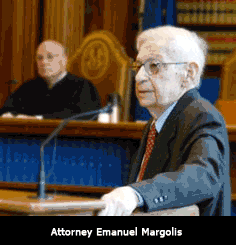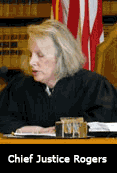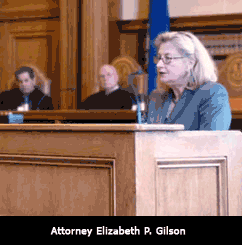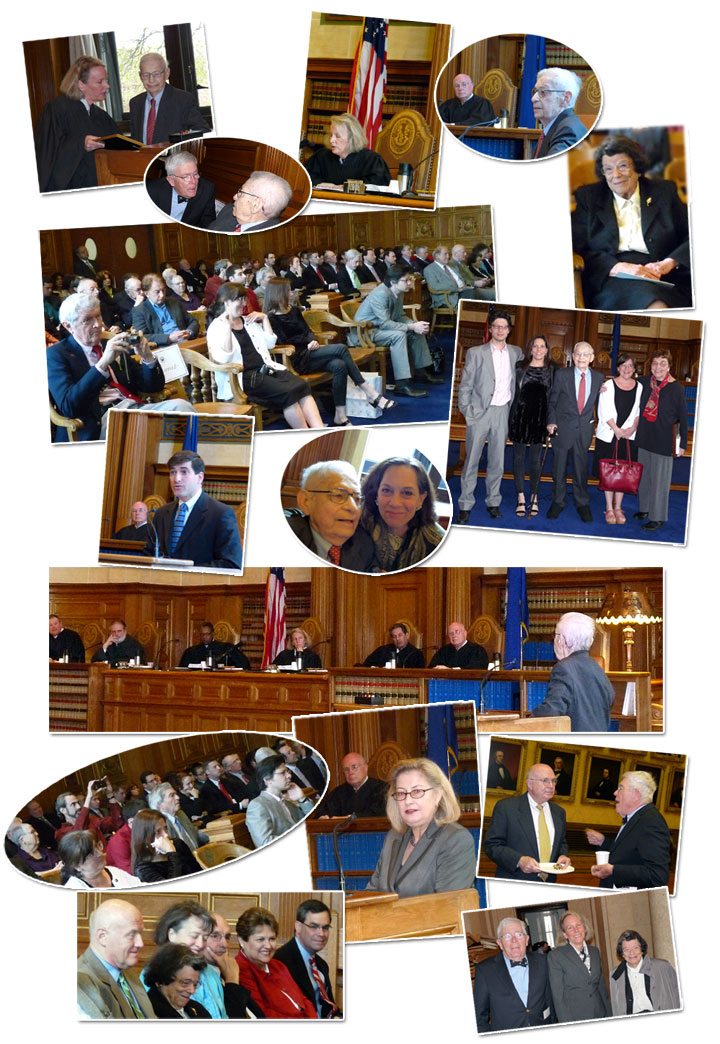|
Supreme Court Celebrates
Constitutional Rights on Law Day:
The Legacy of John
Adams—From Boston to Guantánamo
Speeches:
Chief Justice Rogers |
Attorney Elizabeth Gilson
|
Attorney Emanuel Margolis
| Attorney
Ralph Monaco
 HARTFORD,
May 2, 2011—An octogenarian and champion of the
disenfranchised and a plucky, courageous defender of inmates
at Guantánamo Bay shared the spotlight during the
Connecticut Supreme Court’s Celebration of Law Day. Of
different generations, both Attorneys Emanuel Margolis and
Elizabeth Gilson, have spent their careers ensuring that all
have access to justice—regardless of one’s race, age, sex,
ethnicity, social status, religion or, even, crime. HARTFORD,
May 2, 2011—An octogenarian and champion of the
disenfranchised and a plucky, courageous defender of inmates
at Guantánamo Bay shared the spotlight during the
Connecticut Supreme Court’s Celebration of Law Day. Of
different generations, both Attorneys Emanuel Margolis and
Elizabeth Gilson, have spent their careers ensuring that all
have access to justice—regardless of one’s race, age, sex,
ethnicity, social status, religion or, even, crime.
It was ironic that on the May
morning the Law Day theme—The Legacy of John Adams—From
Boston to Guantánamo—was celebrated, the United States and
the world were still reeling from the news that Al Qaeda
leader, Osama bin Laden, had been assassinated that weekend
at his compound in Pakistan by U.S. Navy Seals.
Opening the ceremony,
 Chief
Justice Chase T. Rogers said, “Thank you for being here this
morning as we celebrate Law Day and this year’s very
relevant theme of The Legacy of John Adams—From Boston to
Guantánamo...When you think about it, if we cherish the
basic Constitutional right that all people—regardless of
what action brought them to court in the first place—deserve
zealous legal representation, then every day our courthouses
are in session spotlights the principles we honor today.”
More Remarks Chief
Justice Chase T. Rogers said, “Thank you for being here this
morning as we celebrate Law Day and this year’s very
relevant theme of The Legacy of John Adams—From Boston to
Guantánamo...When you think about it, if we cherish the
basic Constitutional right that all people—regardless of
what action brought them to court in the first place—deserve
zealous legal representation, then every day our courthouses
are in session spotlights the principles we honor today.”
More Remarks
The Chief Justice spoke of
the Judicial Branch’s Access and Pro Bono initiatives and
added, “Frankly, I can think of few matters more relevant to
this year’s Law Day theme—the heart of pro bono service in
fact, is The Legacy of John Adams—From Boston to Guantánamo.
With that being said, Chief
Justice Rogers introduced the Keynote speaker, Attorney
Elizabeth P. Gilson of New Haven, who, in the Chief
Justice’s words, “…worked tirelessly in a pro bono capacity
to free two brothers from China who were detained at
Guantánamo Bay for eight years.
“Did she do this for fame?” the Chief Justice continued.
“No! Did she do it for ego? No! Rather, Attorney Gilson—a
solo practitioner—took on this difficult and time-consuming
case because it was the right thing to do.”
 For
her work with the Guantánamo detainees, Attorney Gilson
received many an accolade among which was the Connecticut
Law Tribune’s Pro Bono Award in 2010. At the time, according
to the Chief Justice, a colleague of Gilson’s remarked: “I
think Beth exemplifies the citizen lawyer. A lot of us got
involved in this work from large firms that are easily able
to afford it. She reached into her own back pocket to fund
this work, and that’s as good as it gets.” For
her work with the Guantánamo detainees, Attorney Gilson
received many an accolade among which was the Connecticut
Law Tribune’s Pro Bono Award in 2010. At the time, according
to the Chief Justice, a colleague of Gilson’s remarked: “I
think Beth exemplifies the citizen lawyer. A lot of us got
involved in this work from large firms that are easily able
to afford it. She reached into her own back pocket to fund
this work, and that’s as good as it gets.”
Thus, the legacy of John Adams, who braved Colonial scorn by
defending British soldiers accused of killing five
Bostonians in defense of the Customs House, where the King’s
money was stored. The incident began when a lone British
sentry sent a young boy home bruised and crying. An angry
mob rushed back to the Customs House in his defense. After
that a mêlée ensued and the soldiers, who were prohibited
from firing at civilians, responded to the insults,
snowballs and other objects hurled at them with gunfire.
Known as the Boston Massacre, it is also illustrates the
fundamental principle of the rule of law.
Before her remarks, Attorney Gilson, in an aside, noted the
death of bin Laden whom, she said, “…remained a potent
symbol as the mastermind of the September 11th attacks on
our country—criminal acts that set in motion all of the
events that followed.”
During her talk, Attorney Gilson outlined the government’s
reaction to 9/11—its War on Terror—and the inherent threat
that such policies that grew from it would place on “…our
core beliefs advanced by John Adams and our founding
fathers.”
She continued,
“The administration crafted a new, secret detention policy:
Our government could seize anyone, anywhere, and hold him
forever at an offshore prison without any process or charges
whatsoever.”
What followed
was her account of conditions with war criminals and, more
specifically, with the two Chinese detainees she volunteered
to defend. Through it all she was vilified by the
government, the press—even those in the legal field—and
often referred to as a “traitorous terrorist lawyer.”
“Conflict and disagreement
are inherent in our legal system,” she said. “But vilifying
lawyers as unpatriotic for challenging a policy that our
country can hold people in prison forever without legal
basis? For questioning a system of indefinite, open-ended
and boundless detention outside the basic guarantees of our
Constitution? These unwarranted attacks should be condemned
by all who believe in the American system of justice.
“Once we begin compromising
our legal principles and values, no one will be safe from
arbitrary treatment devised by ‘infallible’ government
policy makers whose decisions must not be questioned,”
Attorney Gilson added.
“So
what is the legacy of John Adams as it relates to
Guantánamo?” she asked. “The Guantánamo prison was
established to evade the Constitution, a deliberate attempt
to alter the fundamental relationship of a man to
government. Instead, because lawyers and judges stood up
against injustice, Guantanamo, in that respect, has
facilitated the expansion of the Constitution.
“Guantánamo, the symbol, still remains a stain on our
country, but the Guantánamo litigation has established the
rights of all individuals—not just U.S. citizens—to
challenge unlawful imprisonment.”
More Remarks
Following Attorney Gilson’s remarks, Attorney Ralph J.
Monaco, President of the Connecticut Bar Association,
explained the significance of Law Day—a tradition begun by
President Dwight D. Eisenhower in 1958. “Each Law Day we
celebrate our commitment to the Rule of Law and upholding
the fundamental principles enshrined in our founding
documents,” said Attorney Monaco. “We are reminded today of
the powerful words of President John Adams, who reflected
that we are ‘A government of laws, not men.’”
More
He then turned to Attorney Emanuel Margolis—or Manny as his
colleagues and friends call him—and said, “It is appropriate
for us today to salute Emanuel Margolis, who like John
Adams, has not always represented the most popular in our
society, but he has always sought to uphold the rule of law
for all citizens whether popular or not…Attorney Margolis we
are in your debt for your life-long commitment to the rule
of law and for fighting for a strong and accessible legal
process…Your service to the Bar is nothing short of
exemplary. Congratulations on receiving this well-deserved
award today.”
Attorney
Margolis, 85, and recovering from a bout with cancer, walked
slowly to the podium with the help of his wife of 52 years,
Estelle, then turned to face the Supreme Court Justices and
said, “Osama is dead! Long live the rule of law!”
In her remarks before presenting
Attorney Margolis with his award, Chief Justice Rogers said,
“It’s ironic that the giants among us are so humble. They
don’t boast or brag; instead, they simply make a difference
every day.”
Turning toward
Margolis, the Chief Justice said, “We’re lucky that Manny
decided to devote his career to the practice of law, to
which he has devoted his heart and soul. Our forefathers
would be proud of you, Manny, you represent the legal
profession’s best. You have been on the front lines every
day, fighting for the principles that make this country
great, and you have done it with dignity, civility and
courage.
“In fact, I took
a little poll among lawyers who have known Manny for years,
asking for appropriate words to describe him,” the Chief
Justice continued. “The answers I received overwhelmingly
included the following: Fearless, relentless and a
gentleman. Can you imagine a more complimentary description
of an attorney advocate?”
The Chief Justice then presented Attorney Margolis with an
award “For preserving the rule of law and the adversarial
legal system in this state, by your passionate defense of
the rights of the accused, even in the face of public
controversy.”
The gallery,
which included members of “Manny’s” family, former Chief
Justices Ellen Ash Peters and Francis M. McDonald, Jr. as
well as Department of Children and Families Commissioner and
former Supreme Court Justice Joette Katz, erupted in a
standing ovation which Attorney Margolis soon hushed by a
gently upraised hand.
“I
am pleased to be able to accept this award on behalf of all
the civil rights advocates all over the world,” he said.
“Even as we meet here today they are putting their lives on
the line in the cause of freedom every day. Many of them are
shot at, detained, imprisoned and tortured. The so-called
Middle East Spring has been inspired, in part, by our
American system of democracy.”
More
At the end of his brief speech, leaning upon the podium and
looking out at those gathered, he then turned and addressed
the Bench, “Thank you, I will never forget this day.”
Mouseover images below to view
captions
 |



